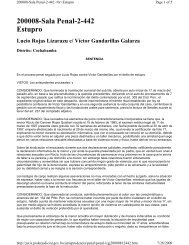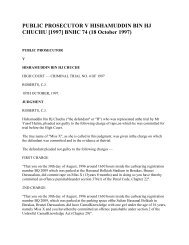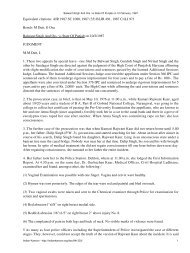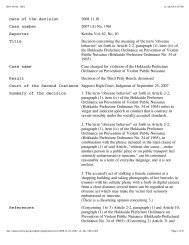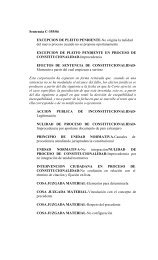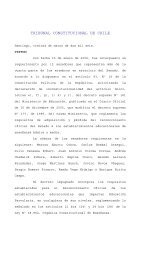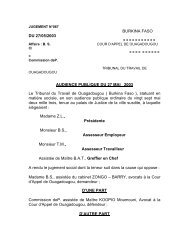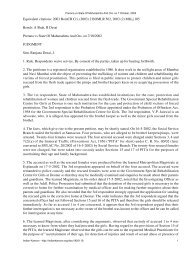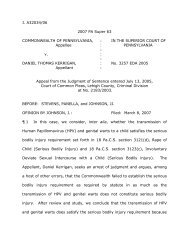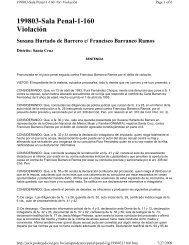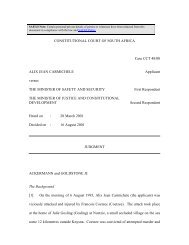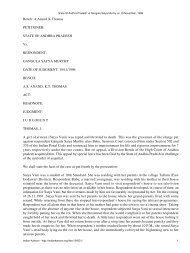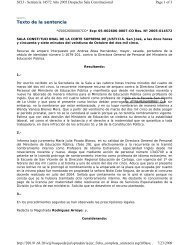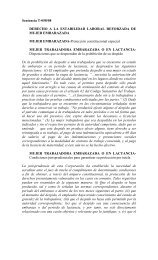P. Rathinam v. Union of India - Cornell University
P. Rathinam v. Union of India - Cornell University
P. Rathinam v. Union of India - Cornell University
- No tags were found...
You also want an ePaper? Increase the reach of your titles
YUMPU automatically turns print PDFs into web optimized ePapers that Google loves.
<strong>of</strong> Independence says about various fasts unto death undertaken by no less a person than Father <strong>of</strong> the Nation,whose spiritual disciple Vinoba Bhave met his end only recently by going on fast, from which act (<strong>of</strong> suicide)even as strong a Prime Minister as Indira Gandhi could not dissuade the Acharya.81. The aforesaid persons were our religious and spiritual leaders; they are eulogised and worshipped. Eventhe allegation against them that they indulged in a non- religious act, would be taken as an act <strong>of</strong> sacrilege. So,where is non-religiosity in the act <strong>of</strong> suicide so far as our social ethos is concerned? And it is this ethos, thissocial mores, which our law has to reflect and respect. (10) Is suicide immoral?82. Law and morals <strong>of</strong>ten intersect and there can be no doubt that historically at least law and morals wereclosely related and that in many areas the law continues to look upon its function as the enforcement <strong>of</strong>morals, the reinforcement <strong>of</strong> moral standards in society, and the punishment <strong>of</strong> moral depravity, as noted at p.19 <strong>of</strong> Burton M. Leiser's Liberty, Justice and Morals (1973). The Constitution <strong>of</strong> United States contains anumber <strong>of</strong> provisions embodying moral judgments, one <strong>of</strong> which is prohibition against 'cruel and unusualpunishment". As to due process clause, it was stated by Justice Frankfurter in Solesbee v. Balkcom31 that it"embodies a system <strong>of</strong> rights based on moral principles ... which comports with the deepest notions <strong>of</strong> what isfair and right and just".83. If, however, the law be unjust would a person not be entitled to Hisobey it? The civil disobediencemovement organised by leaders like Gandhiji shows that there can be clash <strong>of</strong> law and morality, which can beon 94LEd 604:339US9(1949)422the battlefield <strong>of</strong> man's conscience. It is this which agitated the mind <strong>of</strong> Socrates when he was in jail. He wasadvised to escape and was assured that it would be a safe escape. He refused saying that having devoted hislife to teach the importance <strong>of</strong> doing justice and respecting the laws, it would be rank hypocrisy for him toviolate his principles when the laws had been turned against him. Being <strong>of</strong> this view, instead <strong>of</strong> breaking law,he took poison. But then, at times an individual would be between two horns <strong>of</strong> dilemma when confrontedwith the question <strong>of</strong> obeying an unjust and pernicious law. The theories <strong>of</strong> Divine Law and Natural Law wereevolved to take care <strong>of</strong> this dilemma and French Declaration <strong>of</strong> Rights <strong>of</strong> Men and American Declaration <strong>of</strong>Independence are based on these laws.84. In the aforesaid work <strong>of</strong> Burton, this aspect <strong>of</strong> the matter has been concluded at p. 353 by stating as below:"It is right to be law-abiding. But there may be times when it is not wrong to break the law. There are no easyrules or recipes to guide us in making our choices. Some people, who allow themselves to be governed byexpediency and narrow self-interest when they choose to disobey traffic, are indignant when their neighboursviolate laws because their religious and moral convictions do not permit them to do otherwise. Anarchy is aterrible thing. It is all that Hobbes said it was. It is more likely to come from motives like those <strong>of</strong> the speeder,the drunken driver, and the one who cheats on his income tax, rather than from those<strong>of</strong> men like Gandhi, King (meaning Martin Luther King)......(emphasis supplied)P.<strong>Rathinam</strong> vs <strong>Union</strong> Of <strong>India</strong> on 26 April, 199485. Though the question <strong>of</strong> morality normally arises with laws relating to sex and acts evincing moraldepravity like cheating, but as the question <strong>of</strong> birth and death has also moral significance, as opined by MaryWarnock, whose views in this regard have been noted at p. 86 <strong>of</strong> Simon Lee's Laws and Morals (1986), wemay briefly advert to the moral aspect as well relating to suicide. It is the sanctity <strong>of</strong> human life which is saidto be defaced when one commits suicide and the question <strong>of</strong> morality, therefore, arises. We would haveoccasion later to refer to the enactment <strong>of</strong> Suicide Act, 1961 by the British Parliament, when the related Billwas taken up for consideration in the House <strong>of</strong> Lords, the Lord Bishop <strong>of</strong> Carlisle had raised objection on the<strong>India</strong>n Kanoon - http://indiankanoon.org/doc/542988/ 18



